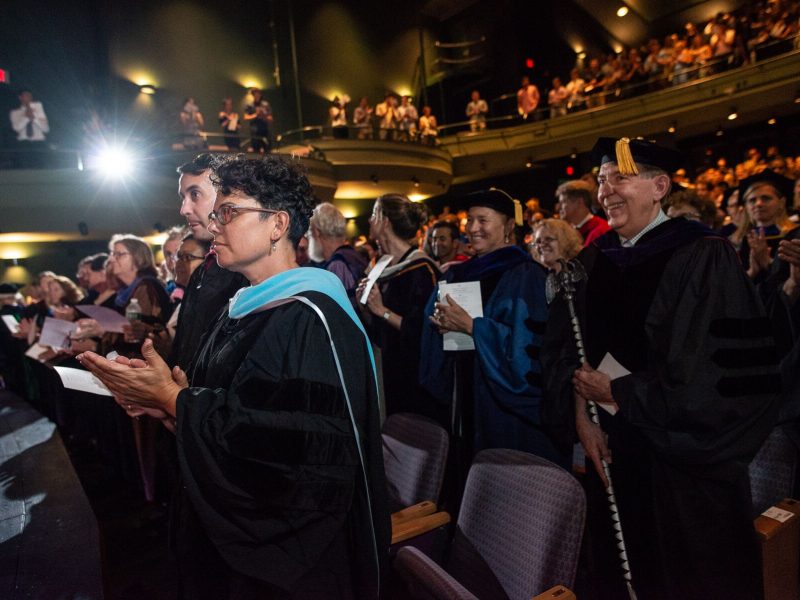Academic Year is Officially Underway with 217th Convocation Ceremony







The College’s annual Convocation ceremony, marking the official opening of its 217th academic year, was held August 28, 2018, in Pickard Theater, Memorial Hall. In his “Opening of the College” address, President Clayton S. Rose welcomed students, as well as faculty and staff colleagues.
Addressing the new Class of 2022, he said “today marks the start of a remarkable journey that, at its best, will include many successes and challenges, new ideas and possibilities, engagement and discovery, and ultimately, accomplishments you likely never thought possible.”
At last year’s Convocation, Rose spoke about the value and usefulness of a liberal arts education. This year, he talked more about the future of Bowdoin and the work that will be done “to shape our education and experience for the next ten, fifteen years and well beyond—work that will continue to prepare our students in this way and to change lives, as we have for many generations.”
Rose discussed the soon-to-be-published study, launched over a year ago, which examines the question: “What knowledge, skills, and creative dispositions do we want every student to possess upon graduation ten years from now?” The study was led by Associate Dean for Academic Affairs Charles Dorn and has engaged with more than 800 community members, said Rose, who described the report as a “stellar piece of work” affirming “many of the best aspects of our education and experience while, at the same time, challenging us to change in important ways.”
Rose went on to talk about challenges facing students in the current environment: “we are in a period of unprecedented change in every aspect of life, and there is no turning back… It is an era of both great promise and significant concern,” he added. “To meet the challenge of preparing our students for this age, we need equal measures of confidence in the profound power and enduring relevance of our core liberal arts tradition and a commitment to build from strength to transform essential aspects of our education and experience.”
Dean of Student Affairs Timothy Foster used his annual “Voices from the Past” address to invoke the legacy of Percival Proctor Baxter, Bowdoin class of 1898. As a legislator, a state governor, and above all, a philanthropist, Baxter has had a lasting impact on the state of Maine, said Foster.
“Percival Baxter’s legacy includes taking on the KKK, donating funds and family property in Falmouth to create a school for the deaf, and working to protect Maine’s waterpower resources, but he is best known for his foresight and unyielding determination to conserve the lands around Katahdin as a wilderness area for the people of Maine.”
Born into immense wealth, Baxter was determined that Kathadin should avoid the fate of New Hampshire’s Mount Washington, where a road was built to the summit, bringing “hordes of people in carriages, then cars, with the natural environment giving way to roads and cabins and development.”
Baxter, who died in 1969 aged ninety-two, first saw Katahdin in 1903 while on a fishing trip with his father, said Foster. By 1917 he had introduced a bill to purchase the mountain from its owner, a paper company, and turn it into a state park. After the bill repeatedly failed to get anywhere, he took matters into his own hands. “Beginning in 1931, Percival Baxter used his personal wealth to do for the state what it refused to do for itself,” Foster told his audience.
Baxter started buying huge tracts of land, and by the time he made his last purchase in 1962, noted Foster, he had acquired and donated more than 200,000 acres. “And in his will, Baxter left a trust of nearly seven million dollars to make sure his vision for this land would endure.”
“Today,” said Foster, “this land is Baxter State Park. It is still independently funded and receives no taxpayer dollars.” The park, which was visited by a number of first-year students on orientation trips last week, contains more than forty peaks and ridges, and 220 miles of hiking trails, he added. It’s also “home to moose, white-tailed deer, black bear, and lynx, and to more than 800 species of plants, many of them rare and endangered varieties.”
As Bowdoin this semester opens its newest building, the Roux Center for the Environment, Foster said “it seems right that we remember this pioneering conservationist.”
This year’s Convocation address was delivered by Professor of Art Michael Kolster. His talk, titled Putting Our Creative Dispositions to Work Across the Curriculum and Beyond, offered some advice on confronting the challenges ahead.
“I want to speak today about three qualities of mind that help us face the unknown,” he said. “They are curiosity, humility, and gratitude. They comprise a healthy creative disposition, they serve as catalysts for lifelong learning, and they can promote decency, tolerance, and mercy in thought and action.” What is meant by “creative disposition?” asked Kolster. To help answer this question, he referred to the college’s mission statement, which talks about instilling “in students the love, the ways, and the habit of learning.”
Central to acquiring a creative disposition, said Kolster, is to pay “open and sustained attention to what surrounds us,” and this, he stressed, involves looking beyond “our limited, selfish perspectives.” Only then can we start engaging our humility and curiosity and start learning. “Together, humility and curiosity can push you to see things ‘as if for the first time.’ “
The most pressing advice Kolster had was for all of us to become less reliant on our phones. “I believe that one of the greatest obstacles to paying attention is our phones,” he said. “These devices pander to what we want and expect. Rather than inspiring original ideas, its groupthink compels us to post canned selfies for general consumption that usually masquerade as achievements, divorced from reality.” He urged students to leave the phone behind whenever possible, to “Stash the phone in your room and walk around, paying attention to what you may have missed in the daily rush to class, rehearsal, or athletic practice.”
The musical interlude was performed by Miranda Miller ’19, on violin, and Matthew Maguire ’19, on piano. They performed the first movement of Violin Sonata, no. 5, op. 24 “Spring Sonata” by Ludwig Van Beethoven (1770-1827).
Convocation Addresses
Read President Clayton Rose’s “Opening of the College” Address.
Read Dean of Student Affairs Timothy Foster’s “Voices from Bowdoin’s Past.”
Read Professor Michael Kolster’s talk, “Putting Our Creative Dispositions to Work, Across the Curriculum and Beyond.”
View the program for the 217th Convocation.